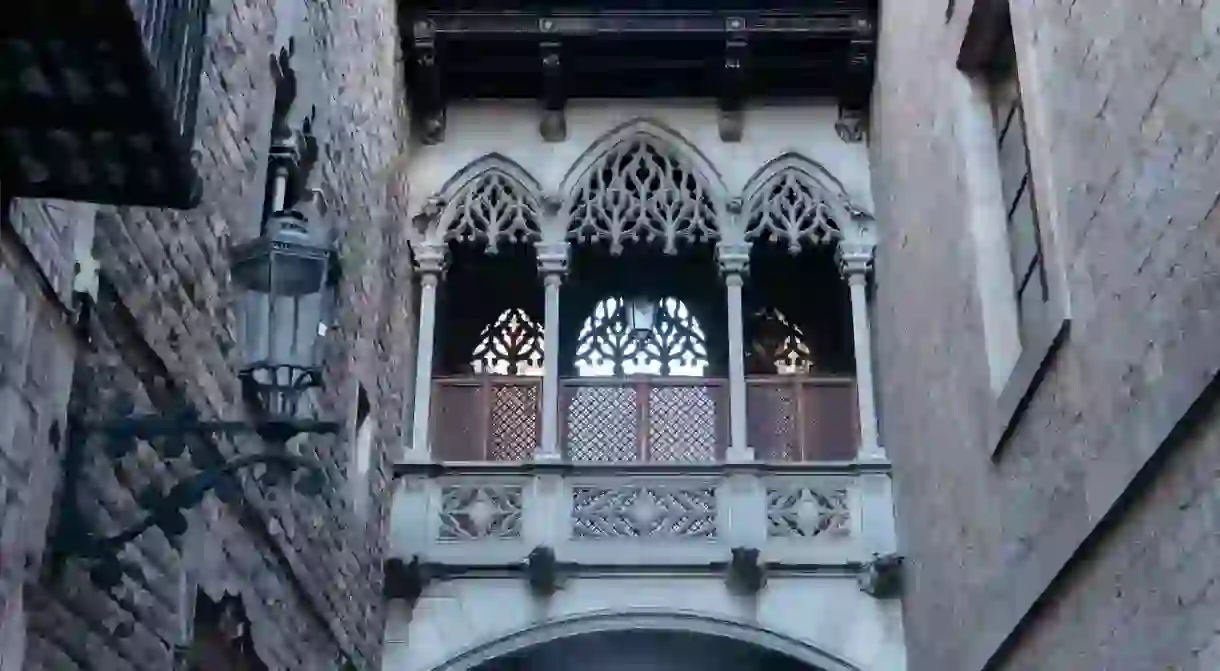Discover Barcelona's Gothic Quarter

Without a doubt the most iconic of Barcelona’s neighborhoods, the Gothic Quarter as it is commonly referred to is the heart of Barcelona’s old town. Home to some of the most ancient and historic monuments in the city, not least of which being the majestic cathedral, this is the Barcelona of narrow streets and charming outdoor squares that have remained unchanged throughout the centuries. Read on to discover the highlights of this most romantic of Barcelona neighborhoods.
A Bit Of Background History
Trying to sum up the history of this most ancient of neighborhoods would never do it justice, as the site of the Gothic Quarter today has been the heart of civilization in Barcelona for centuries. When the Romans built what was then known as Barcino, they erected walls around the city which back then occupied just a small part of what is now the Gothic Quarter. Later, during the 12th century, the walls of the city were extended to contain the Gothic Quarter and nearby El Born but stopped at the Ramblas.
It’s easy to see that the Gothic was for a long time the epicenter of life in Barcelona, home to the major administrative offices of the city as well as homes, churches, and shops. Interestingly, the reason the Boqueria market was built outside the walls of the city (in present day El Raval) was so that traders would not have to pay the import tax imposed on produce traded within the city itself.

Despite all of this – and the name of the area itself – many of the buildings visible in the Gothic Quarter today were constructed in the 19th and 20th centuries and are in fact neo-Gothic in style. The most famous example of this is the cathedral itself, of which the ‘Gothic’ facade was actually an add-on from the 19th century. To get a sense of what the cathedral looked like before, you can walk down the sides of the building, which remain mostly unchanged.
Where To Eat
Unsurprisingly, the Gothic Quarter is the most visited part of Barcelona, and with this of course come the problems of any major tourist site. There are a great number of bars and restaurants that specialize in attracting tourists with the lure of authentic home-cooking only to be served a defrosted paella.
Fortunately there are also some great eateries tucked away among the backstreets of the Gothic Quarter, and it’s easy to eat well if you’re prepared to do a little research. One such place is Pla, an authentic Catalan restaurant located near the basilica, which serves a selection of dishes both old and new in a friendly, relaxed atmosphere. Just around the corner, and owned by the same people, the Cometa del Pla opened its doors just last year and offers a taste of modern Barcelona: natural wines, a flexitarian menu where vegetables are given special attention, and organic ingredients.

Finally, it’s worth giving a chance to some of the older – and most famous – restaurants of the Gothic Quarter, some of which have managed to retain their integrity despite their popularity. The Quatre Gats is renowned for having been the favorite hangout of the artist Pablo Picasso, and to this day the artwork on the menu is the same one that the artist designed for them in the early 20th century. Located on the Plaça Reial, it is something of a Barcelona institution, and a reservation is essential at popular times.
What To See And Do
Knowing where to start when it comes to discovering the Gothic Quarter can be tricky, and in many ways the best way to enjoy the charm of the neighborhood is to let yourself get lost in its backstreets. Start with a visit to the cathedral, which is sure to get you in the mood for more of the (neo-)Gothic architecture, before wandering down the side streets to the cloister, home to a stunning indoor garden.
Further into the Gothic Quarter, you’ll find the basilica of Santa Maria del Pi, named after the pine tree, or ‘pi’ in Catalan, that once stood on the square. The stained glass window was destroyed during the Spanish civil war, however the rest of structure dates back to the Middle Ages and is a prime example of authentic Gothic architecture.

Finally, there is much more to the Gothic Quarter than first meets the eye, and visitors should be prepared to do a little research into some of the neighborhood’s best kept secrets. The letter box designed by Catalan architect Lluis Domenech i Montaner caused quite a stir when it first appeared on the wall of the seat of the local magistrates and is rumored to hold the cure to those who receive the deadly curse on the Bishop’s bridge.
Where To Stay
The Gothic Quarter is home to everything from grandiose five-star hotels to romantic boutique-hotels tucked away on forgotten squares. Given the popularity of the area, expect to pay more than you would in other neighborhoods, but in some cases the expense is well worth it.
The Ohla Hotel is located along the Via Laietana, just a minute away from Plaça Catalunya and the Portal de l’Angel shopping area and is a stylish modern hotel with a Michelin-star restaurant inside. A similar option is the Hotel Serras, located just across for the Marina Port Vell, which is located on the site of Picasso’s first apartment in the city.

Tucked away in the backstreets of the Gothic Quarter, the Hotel Neri is a boutique hotel that oozes romance and charm and is located on one of the most famous squares in the old town: the Plaça Felipe Neri. Another option for those looking for something quaint is the Hotel Duquesa de Cardona, also located by the waterfront of the old port and boasts a delightful rooftop terrace.













